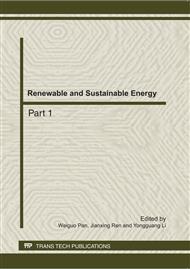[1]
IPCC (2007).Climate Change (2007) the Physical Science Basis. Summary for Policymakers.
Google Scholar
[2]
Verdantix (2010) US Sustainable Business Spending 2009. retrieved 4 Oct 2010 www.verdantix.com
Google Scholar
[3]
Binks M. (2010) 'We must promote sustainable leadership' The independent 7 Oct (2010)
Google Scholar
[4]
Australian.Gov (2010) Environmental Sustainability & Shaping a global solution, climatechange.gov.au. retrieved: 7 Oct (2010)
Google Scholar
[6]
Purcell. J. (2010) An Assessment of key Internal and External Drivers Shaping Professional accounting bodies' Sustainability Agendas, Sustainability in Key Professions: Accountancy, Informa, Sydney 30 Sept
Google Scholar
[7]
Steele, R., Secombe, C., Lo, A & Wong, Y.K. (2009) 'Evaluating the Elderly's Perception of Wireless Senser Networks for Aged-care Health Monitoring, Intl. J of Medical Informatics
Google Scholar
[8]
Dalal-Clayton, Barry and Sadler, Barry (2009). Sustainability Appraisal. London: Earthscan. [9] Bell S., and Morse S (2008) Sustainability Indicators. Measuring the Immeasurable? 2nd edition. London: Earthscan.
Google Scholar
[10]
International Institute for Sustainable Development (2010) Sustainable Devlp. Indices. rectrived 10 July 2010 http://www.iisd.org/
Google Scholar
[11]
UN Dept. of Econ. And Social Affairs (2007) Indicators of Sustainable development, 3rd Ed. Indicators of United Nations New York
Google Scholar
[12]
Wong, Y.K. (2011) Do Developers Matter in System Review? International Journal of Behaviour & Information Technology
Google Scholar
[13]
Homer, P. Kahle, L. (1988) A Structural Equation Test: Value-Attitude-Behaviour J. of Personality & Social Psychology 54, 638-64
DOI: 10.1037/0022-3514.54.4.638
Google Scholar
[14]
Davis F D 1989 Perceived Usefulness, Perceived Ease of Use, and User acceptance of Information Technology MISQ 13(3) 319
DOI: 10.2307/249008
Google Scholar
[15]
Venkatesh,V. Morris M. Davis, F.D., User acceptance of IT: Toward a unified view, MIS Q, 2003, 27, 3, 425-478.
DOI: 10.2307/30036540
Google Scholar
[16]
Wong Y.K. & C.J. Hsu, (2008) A Confidence-based Framework for Business to Consumer Mobile Commerce Adoption, Special Issue, "Business-to-Consumer Mobile Business Personal and Ubiquitous Computing," in Springer Publisher.
DOI: 10.1007/s00779-006-0120-5
Google Scholar
[17]
Kelman, H. (1958). Compliance, identification, and internalization: Three processes of attitude change. Journal of Conflict Resolution, 1, 51-60.
DOI: 10.1177/002200275800200106
Google Scholar
[18]
Boele, R (2010) Accountability & Materiality, Sustainability in Key Professions: Accountancy, Informa, Sydney 30 Sept (2010)
Google Scholar
[19]
Adams CA & McNicholas P (2007) Making a difference: Sustainability reporting, accountability and org. change, Accounting, Auditing & Accountability J., 20(3) 382 - 402
DOI: 10.1108/09513570710748553
Google Scholar
[20]
Global Reporting Initiative, (2010) retrieved: 4 Mar 2010 http://www.globalreporting.org/Home
Google Scholar
[21]
Hemphill L, Berry J, McGreal S (2004) Urban studies 41(4)752
Google Scholar
[22]
Wheeler D & Elkington J (2001) The end of the corporate environmental report? Business Strategy and the Environment 10(1) 1–14
Google Scholar
[23]
Yin R. (1994) Case study research: Design and methods 2nd ed. Beverly Hills, CA: Sage
Google Scholar


